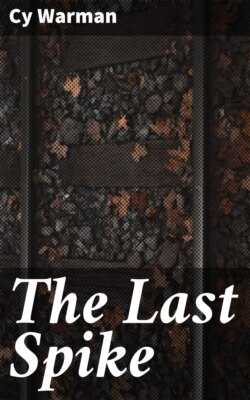Читать книгу The Last Spike - Cy Warman - Страница 5
На сайте Литреса книга снята с продажи.
III
ОглавлениеTable of Contents
When Bradford came to they were fixing him for the fun. His back was against a tree, his feet pinioned, and his elbows held secure by a rawhide rope. He knew what it meant. He knew by the look of joy on the freshly smeared faces at his waking, by the pitch-pine wood that had been brought up, and by the fagots at his feet. The big chief who had felt his fist came up, grinning, and jabbed a buckhorn cactus against the engineer's thigh, and when the latter tried to move out of reach they all grunted and danced with delight. They had been uneasy lest the white man might not wake.
The sun, sailing westward in a burnished sea of blue, seemed to stand still for a moment and then dropped down behind the range, as if to escape from the hellish scene. The shadows served only to increase the gloom in the heart of the captive. Glancing over his shoulder toward the east, he observed that his captors had brought him down near to the edge of the plain. Having satisfied themselves that their victim had plenty of life left in him, the Indians began to arrange the fuel. With the return of consciousness came an inexpressible longing to live. Suddenly his iron will asserted itself, and appealing to his great strength, surged until the rawhide ropes were buried in his flesh. Not for a moment while he stood on his feet and fought them on the morning of that day had hope entirely deserted him. Four years of hardship, of privation, and adventure had so strengthened his courage that to give up was to die.
Presently, when he had exhausted his strength and sat quietly, the Indians went on with the preliminaries. The gold in the west grew deeper, the shadows in the foothills darker, as the moments sped. Swiftly the captive's mind ran over the events of the past four years. This was his first failure, and this was the end of it all—of the years of working and waiting.
Clenching his fists, he lifted his hot face to the dumb sky, but no sound escaped from his parched and parted lips. Suddenly a light shone on the semicircle of feather-framed faces in front of him, and he heard the familiar crackling of burning boughs. Glancing toward the ground he saw that the fagots were on fire. He felt the hot breath of flame, and then for the first time realized what torture meant. Again he surged, and surged again, the cedars crackled, the red fiends danced. Another effort, the rawhide parted and he stood erect. With both hands freed he felt new strength, new hope. He tried to free himself from the pyre, but his feet were fettered, and he fell among his captors. Two or three of them seized him, but he shook them off and stood up again.
But it was useless. From every side the Indians rushed upon him and bore him to the ground. Still he fought and struggled, and as he fought the air seemed full of strange, wild sounds, of shouts and shots and hoof-beating on the dry, hard earth. He seemed to see, as through a veil, scores of Indians, Indians afoot and on horseback, naked Indians and Indians in soldier clothes. Once he thought he saw a white face gleam just as he got to his feet, but at that moment the big chief stood before him, his battle-axe uplifted. The engineer's head was whirling. Instinctively he tried to use the strong right arm, but it had lost its cunning. The roar of battle grew apace, the axe descended, the left arm went up and took the blow of the handle, but the edge of the weapon reached over and split the white man's chin. As he fell heavily to the earth the light went out again.
Save for the stars that stood above him it was still dark when Bradford woke. He felt blankets beneath him, and asked in a whisper: "Who's here?"
"Major North, me call him," said the Pawnee scout, who was watching over the wounded man.
A moment later the gallant Major was leaning over Bradford, encouraging him, assuring him that he was all right, but warning him of the danger of making the least bit of noise.
